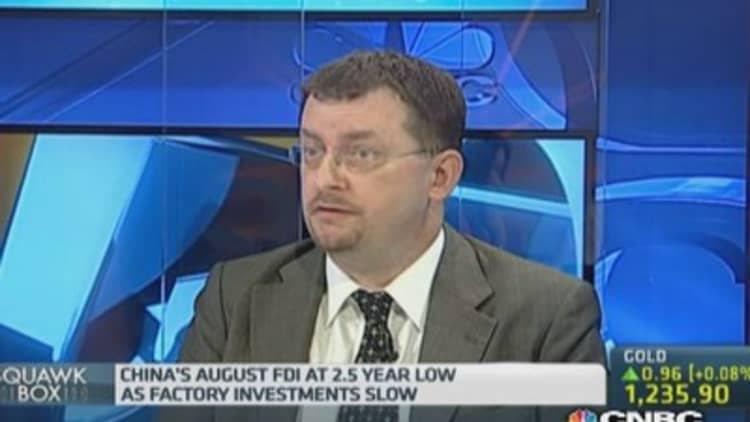The People's Bank of China (PBoC) eased short-term borrowing costs for banks on Thursday, a "strong signal" that a rate cutting cycle is near, according to Barclays.
The PBoC cut the 14-day repo rate by 20 basis points to 3.5 percent in its bi-weekly open market operations, its second such move in two months after a 10 basis point reduction in July.
"[The] move sends a clear and strong signal, in our view, that the PBoC is more convinced that it needs to make more efforts to guide interest rates lower, after the July-August data pointed to a clear deterioration in the economic outlook and weakening domestic demand," Jian Chang, China economist at Barclays wrote in note.
Read MoreWeak China factory data raise prospect of stimulus
Economic indicators for August showed decelerating industrial production, slowing investment growth, contracting imports, subdued CPI inflation, and widening PPI deflation, fueling concerns of slowing growth in the world's number two economy.
A rate cut would support demand, reduce the economy's debt burden and ease financial risks, said Chang.
"A lower interest rate environment is necessary for China's deleveraging process over the next few years," Chang said. He expects a 25-basis-point rate cut in the fourth quarter and another in the first quarter of 2015. The one-year benchmark interest rate in China stands at 6 percent.
Read MoreIs this the China stimulus we've been waiting for?
Not all agree a rate cut is appropriate.
Following the PBOC's move, central bank adviser Chen Yulu said China should avoid cutting interest rates and deploy other strategies to keep M2 – the broad measure of money supply –growing at an annual rate of around 13 percent, Reuters reported.
Alistair Chan, economist at Moody's Analytics, believes a rate cut could be counterproductive for the economy.

"With the Federal Reserve raising rates, it's hard to cut. The PBoC would likely be fearful of capital outflows that could make the slowdown a lot worse," he said.
Read MoreWhy Chinese money is flooding American markets
The PBoC is more likely to cut the reserve requirement ratio – the amount of deposits that banks need to hold at the central bank – before year-end to boost liquidity, he said.
Earlier this week, the PBoC reportedly injected a total of $81 billion into the big five major state-owned banks to improve liquidity in the financial system. The central bank has neither confirmed nor denied the reports.


